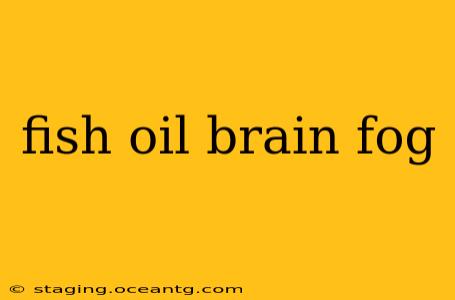Brain fog. That frustrating feeling of mental cloudiness, difficulty concentrating, and poor memory. Millions experience it, and many are seeking natural solutions. Fish oil, rich in omega-3 fatty acids EPA and DHA, has emerged as a potential remedy. But does it truly work? Let's delve into the science and explore the connection between fish oil and brain fog.
What is Brain Fog?
Before we dive into fish oil, it's crucial to understand brain fog itself. It's not a clinically defined condition but rather a collection of symptoms that can stem from various underlying causes. These symptoms often include:
- Difficulty concentrating and focusing: Feeling unable to maintain attention on tasks.
- Poor memory: Struggling to recall recent events or information.
- Mental fatigue: Experiencing persistent tiredness and lack of mental energy.
- Slowed thinking: A perception of sluggish cognitive processing.
- Confusion and disorientation: Feeling mentally muddled and disoriented.
Causes of brain fog are diverse, ranging from sleep deprivation and stress to hormonal imbalances and underlying medical conditions. Identifying the root cause is vital for effective treatment.
How Does Fish Oil Work?
Fish oil's potential benefit lies in its high concentration of EPA (eicosapentaenoic acid) and DHA (docosahexaenoic acid), essential omega-3 fatty acids. These fats are crucial components of brain cell membranes and play a significant role in various brain functions, including:
- Neurotransmission: Omega-3s influence the communication between brain cells, impacting cognitive speed and clarity.
- Neuroinflammation: Chronic inflammation in the brain can contribute to cognitive impairment. Omega-3s possess anti-inflammatory properties that may mitigate this.
- Brain structure and function: DHA is a major structural component of the brain, and adequate levels are essential for optimal function.
Can Fish Oil Reduce Brain Fog?
While promising, the research on fish oil's effect on brain fog is still ongoing and somewhat inconclusive. Some studies suggest a positive correlation between omega-3 supplementation and improved cognitive function, particularly in individuals with existing cognitive deficits. However, more research is needed to definitively establish a causal relationship, especially in those experiencing brain fog without a diagnosed condition.
What are the Side Effects of Taking Fish Oil?
Fish oil is generally considered safe for most people, but potential side effects can include:
- Fishy burps: A common and often temporary side effect.
- Heartburn: Some individuals experience gastrointestinal discomfort.
- Increased bleeding risk: Fish oil can interact with blood thinners, so consult your doctor before taking it if you are on anticoagulants.
- Allergic reactions: Although rare, allergic reactions are possible.
How Much Fish Oil Should I Take for Brain Fog?
There's no universally recommended dosage for fish oil to combat brain fog. The optimal amount varies depending on individual factors such as age, health status, and the severity of symptoms. It's crucial to consult a healthcare professional to determine the appropriate dosage for your specific needs. They can assess your current health status and recommend the suitable amount and type of fish oil supplement.
Does Fish Oil Interact with Other Medications?
Yes, fish oil can interact with certain medications, especially blood thinners. Always inform your doctor about any supplements you are taking, including fish oil, to avoid potential adverse effects. Interactions can be complex, and professional guidance is important to ensure safety.
Are There Other Natural Ways to Combat Brain Fog?
While fish oil might offer benefits, it's essential to adopt a holistic approach to managing brain fog. Lifestyle modifications can significantly impact cognitive function. These include:
- Improving sleep hygiene: Prioritizing quality sleep is fundamental for brain health.
- Managing stress: Chronic stress negatively impacts cognitive performance. Incorporate stress-reducing techniques like exercise, yoga, or meditation.
- Following a healthy diet: Nourishing your brain with a balanced diet rich in fruits, vegetables, and whole grains is crucial.
- Regular exercise: Physical activity improves blood flow to the brain, enhancing cognitive function.
Conclusion
Fish oil, with its rich omega-3 content, shows promise in potentially improving some aspects of cognitive function. However, more research is needed to firmly establish its effectiveness in treating brain fog. A holistic approach that combines supplementation with lifestyle modifications offers the best chance of alleviating brain fog symptoms. Always consult a healthcare professional before starting any new supplements, especially if you have pre-existing health conditions or are taking other medications. They can provide personalized advice based on your individual needs and circumstances.
